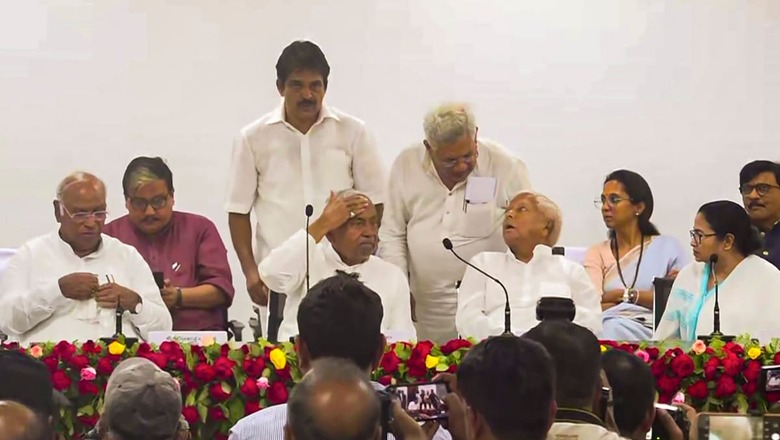
views
There were several takeaways from the Patna meeting of the grand alliance of Indian opposition parties, but most crucially, there were lessons for the coalition itself. In a display of commendable initiative, political parties recently convened for a meeting aimed at forging an alliance. While this endeavour is certainly praiseworthy, it is important to acknowledge that the gathering has also inadvertently exacerbated existing divisions, inflexibility, and a reluctance to venture beyond the confines of comfort zones within these parties.
In what was anticipated to be a relatively uneventful opposition gathering, little did anyone foresee the intense political clash that unfolded between the Congress party and the Aam Aadmi Party. While no significant developments were foreseen, the unexpected sparring match between these two political factions certainly caught many off guard. The recent gathering serves as a glaring testament to the underlying fractures within the opposition coalition. However, what truly stands out is that failure to promptly address these internal rifts will inevitably lead to a formidable obstacle for the opposition unity, or mahagathbandhan, in the days to come: a clash between regional ambitions and national priorities.
K Chandrashekar Rao, the chief minister of Telangana and Bharat Rashtra Samithi’s leader, was not invited, nor was Bahujan Samaj Party leader Mayawati. The question of whether one would grace the meeting with their presence or not is an entirely separate matter, warranting a distinct conversation. In the midst of political deliberations, a prevailing sentiment emerged that all opposition parties would unite in their pursuit of victory in the 2024 elections. However, a crucial question loomed: were the state units of the Congress aligned with this collective resolve? The lack of clarity surrounding this matter added an intriguing layer of uncertainty to the unfolding political landscape. In the wake of a recent opposition meeting, Adhir Ranjan Chowdhury, the president of the West Bengal Pradesh Congress, did not mince words when expressing his discontent with chief minister Mamata Banerjee’s standing as a credible opposition politician.
In a bold and unequivocal stance, AAP has made it abundantly clear that it will not entertain the idea of joining forces with any political alliance unless the Congress takes a firm stand against the central government’s ordinance pertaining to the Delhi government. The gravity of these concerns cannot be understated, as the egocentric nature of these political factions will inevitably inflict damage on the opposition coalition. The question of whether these parties are prepared to make concessions regarding their regional ambitions remains shrouded in uncertainty. However, it appears evident that they are far from willing to do so without a fight, despite their profuse praise for the opposition alliance.
Regional parties have played a pivotal role in influencing the governance dynamics of the Indian political landscape. Political leaders such as Akhilesh Yadav, Mamata Banerjee, and Arvind Kejriwal have emerged, championing the interests and aspirations of their respective regions. Nonetheless, as they assert their regional identities and interests, these leaders confront the daunting task of finding common ground and aligning their objectives with the national agenda. In the realm of regional politics, a pressing imperative emerges: the delicate art of balancing regional identities and interests with the broader national agenda. This intricate task demands strategic manoeuvring and a deft touch. On one hand, regional parties must skillfully champion the concerns of their respective regions. Should these parties perceive that the opposition alliance fails to revolve around their distinctive regional priorities, the formation of any alliance becomes an insurmountable challenge.
The Congress party, historically, has been criticised for its lack of regard for regional politics and the unique identities of regional political parties. For instance, the current ethnic tensions in the Northeast, centred on Manipur, are the result of prior mistakes made by the Congress. This is why it is crucial to recognise that the Congress has displayed a distinct lack of interest in acknowledging or empathising with the regional priorities of opposition political parties. In a rather intriguing turn of events, the political landscape witnessed a clash of ideologies when Rahul Gandhi made a mocking comment directed towards Veer Savarkar. The incident, which occurred several months ago, sparked a strong reaction from the Uddhav Thackeray-led faction of the Shiv Sena, a political ally of the Congress party.
Gandhi’s remark about Savarkar, a well-known person in Maharashtra and India, did not go unnoticed. The response from the Shiv Sena (UBT), known for its staunch support of Savarkar’s legacy, was swift and unyielding. They wasted no time in expressing their disapproval of Gandhi’s comment, highlighting the deep ideological divide between the two factions. This clash between the Congress and its ally, the Shiv Sena (UBT), shed light on the complex dynamics within Indian politics. It underscores the importance of maintaining a delicate balance between political alliances and individual beliefs and respecting regional priorities. In the realm of political alliances, the notion that a cohesive opposition front can be forged becomes questionable when the Congress party adheres to the belief that national concerns should take precedence while regional interests are relegated to the periphery. Such a strategy, it must be said, is fundamentally flawed.
One must acknowledge the formidable challenge that lies ahead for the opposition alliance. The task at hand is no simple feat, as a significant number of opposition political parties, such as the Trinamool Congress, the Nationalist Congress Party, the Samajwadi Party, and others, have established their presence in specific regions by successfully diverting votes away from the Congress party. It is of utmost importance to recognise the inherent disparities that persist between these political factions, as they are fundamentally rooted in a lack of underlying trust within these organisations. In an era dominated by photo opportunities and political rhetoric, it is imperative for our political parties to transcend these superficialities and confront the reality at hand. It is high time for them to shed the false lines that have been drawn and truly address the pressing issues facing our nation.
It was announced at the meeting in Patna that the next meeting will be held in Shimla (now shifted to Bengaluru) this month, and the opposition political parties must immediately reach an agreement on how the Congress will support the regional political parties with regard to their regional priorities, and how the regional political parties will reach an agreement with the Congress on issues of greater national interest.
Merely acquiescing to the notion that political parties of disparate backgrounds and contrasting priorities will unite and engage in electoral combat falls short of the mark. Throughout the course of Indian political history, from the era of the United Progressive Alliance (UPA) to the various governments helmed by Prime Ministers such as Chandra Shekhar, VP Singh, and Atal Bihari Vajpayee, one recurring theme has been the detrimental impact of a dearth of comprehension among coalition partners on the overall stability of a government. It is of utmost importance for opposition political parties to grasp the fact that voters have no inclination towards an unstable government as they head to the polls. The electorate has made it abundantly clear in both the 2014 and 2019 elections that they sought a political party that could offer them a government that exuded stability, strength, and decisiveness.
In order for the opposition alliance to achieve success, it is imperative that we dispel the illusory notion of a delicate equilibrium between regional priorities and national interests. This fallacy, if left unaddressed, will undoubtedly hinder the alliance’s progress. In the context of politics, the dynamics of alliances can be a fickle affair. While it may seem plausible for opposing factions to unite in the face of an impending election, the question of whether this camaraderie can withstand the test of time remains dubious. History has shown that alliances forged solely for electoral gains often crumble once the ballots have been cast. The inherent challenges and divergent interests that lie beneath the surface tend to resurface, rendering such post-election alliances ineffective at best. Therefore, it is the ideal time to identify your differences and work out your disputes in an amicable manner.
Sayantan Ghosh is a professor, researcher and political columnist. He tweets @sayantan_gh. Views are personal, and do not represent the stand of this publication.




















Comments
0 comment